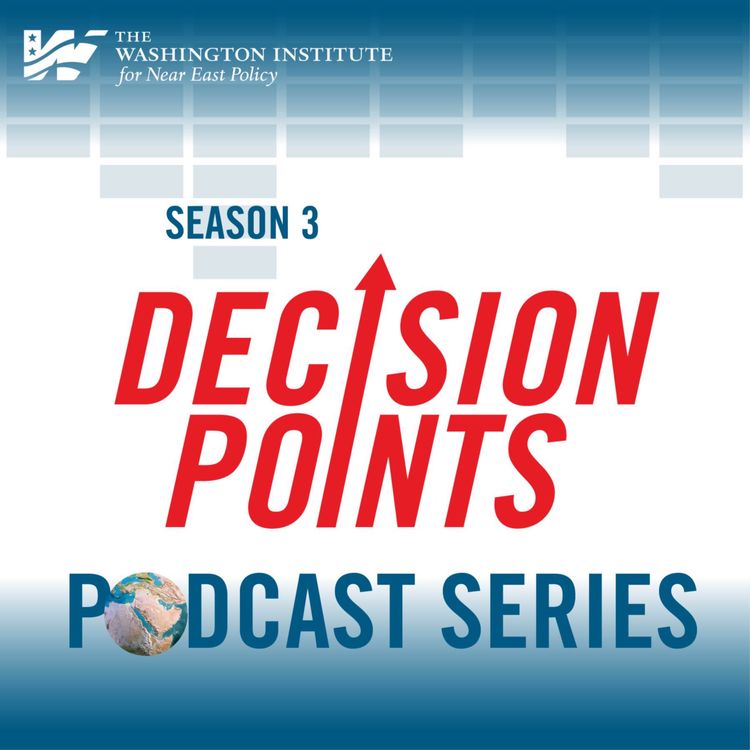Share

Decision Points
The Abraham Accords One Year Later: Can They Change the Middle East?
August 13 marked the first anniversary of the breakthrough normalization agreement between Israel and the United Arab Emirates—a deal followed shortly by accords with Bahrain, Sudan, and Morocco. In addition to strong U.S. mediation, several broader forces brought these countries together, including mutual concerns about Iran, Arab recognition of how Israeli technology could help their societies, and a desire to bolster the stability of pro-Western governments amid questions about America’s long-term commitment to the Middle East.
Now that some Arab leaders see Israel as part of a solution to their challenges and are unencumbered by the enmity of the past, what will it take to deepen these relationships and extend them to other states? How does the Palestinian issue play into this effort? And what can Washington do to strengthen the Abraham Accords?
To discuss these questions, David Makovsky hosts renowned experts Ebtesam al-Ketbi, Amos Yadlin, and Thomas Friedman.
Ebtesam al-Ketbi is founder and president of the Emirates Policy Center and the first Arab woman to lead a think tank. Additionally, she is a professor of political science at United Arab Emirates University and a member of the Gulf Cooperation Council’s Consultative Commission.
Amos Yadlin was executive director of the Institute for National Security Studies at Tel Aviv University from November 2011 to May 2021. He also served in the Israel Defense Forces for forty years, including posts with the General Staff and as chief of military intelligence.
Thomas Friedman is an internationally renowned author, reporter, and columnist. He has written seven New York Timesbestsellers and received three Pulitzer Prizes—two for reporting from the Middle East and a third for his columns about 9/11.
See acast.com/privacy for privacy and opt-out information.
More episodes
View all episodes

14. Post-Sinwar: Hostages, Succession & Thwarting Hamas Revival
58:56||Season 5, Ep. 14On October 16th, the world was shocked to learn that the architect of the October 7th attacks, Yahya Sinwar, was killed by an IDF infantry unit. Yahya Sinwar’s death was a central goal of the Israeli war effort, and it marks a significant turning point for Hamas leadership, hostage negotiations, and Palestinian society. In this episode, David Makovsky is joined by two experts, Ghaith Al-Omari and Dr. Michael Milshtein. Ghaith Al-Omari is a senior fellow at The Washington Institute, former executive director of the American Task Force on Palestine, and former advisor to the Palestinian negotiating team. Dr. Michael Milshtein is the Head of the Palestinian Studies Forum at Tel Aviv University, and he formerly was the Advisor on Palestinian Affairs in COGAT and the Head of the Department for Palestinians Affairs in IDF Military Intelligence. Together, they will explore the implications of this high-profile death on Hamas's internal politics, potential shifts in regional power dynamics, and what it could mean for Israel’s next steps in the conflict.
13. Trump & Harris Senior Advisors Contrast Visions for US Middle East Policy
01:11:57||Season 5, Ep. 13On November 5th, Americans will head to the polls to make a decision that will shape U.S. foreign policy towards the Middle East for years to come. Now more than ever, it is important to understand the critical foreign policy decisions that lie ahead for the United States. With the Middle East at a pivotal juncture, the outcome of this election will have lasting implications for U.S.-Israel relations, regional diplomacy, and the day after in Gaza.In this episode, David Makovsky is joined by two distinguished experts: Tom Nides and Victoria Coates. Tom Nides served as U.S. Ambassador to Israel during the Biden administration. Victoria Coates is the former Deputy National Security Advisor for the Middle East and North Africa under President Trump. Together, they provide a comprehensive look at each candidate's position on these important issues. Join us for an extremely timely discussion on how the next U.S. administration could shape the region's future.
12. Hezbollah Decapitated?: The War with Israel and Lebanon's Future
52:33||Season 5, Ep. 12The past few weeks have been some of the most pivotal in Israel’s modern history with Lebanon. Recently, Israeli intelligence and operational successes have delivered devastating blows to Hezbollah’s leadership, decapitating its senior command, including the infamous Hassan Nasrallah. With thousands displaced across Northern Israel and Lebanon due to the conflict, tensions have never been higher.In this episode, David Makovsky is joined by two leading experts: Hanin Ghaddar and Matt Levitt. Hanin, a senior fellow at the Washington Institute, has written extensively on Hezbollah's role in Lebanon's political system and Iran's growing influence in the region. Matt Levitt is the director of the counterterrorism and intelligence program at the Washington Institute. He has held key roles in the U.S. government, including deputy assistant secretary for intelligence and analysis at the U.S. Department of the Treasury. He recently published a new version of his book Hezbollah: The Global Footprint of Lebanon's Party of God. Together, they will explore the internal dynamics within Lebanon amidst this crisis, what this moment means for the future of Hezbollah, and the strategic and operational factors that underpin these developments.
11. Iran, Israel & Missiles: Roots of Iran's Enmity & Military Escalation
55:38||Season 5, Ep. 11Iran's recent ballistic missile attack on Israel marks a significant escalation in their long-standing enmity. This attack, one of the largest in history, raises critical questions about the future of the relationship and the region at large. As tensions peak, the strategic, political, and ideological dimensions of this rivalry take on even greater importance, with both Israel’s defensive responses and Iran's aggressive stance setting the stage for potential further clashes. In this episode of Decision Points, David Makovsky is joined by two leading experts: Ray Takeyh and Meir Litvak. Ray Takeyh is a senior fellow for Middle East studies at the Council on Foreign Relations, specializing in Iran, U.S. foreign policy, and the modern Middle East. Meir Litvak, professor at Tel Aviv University and director of the Alliance Center for Iranian Studies, brings decades of expertise in the intersection of religion, society, and politics in Iran, with a focus on Shi’a Islam and Iranian nationalism. Together, they delve into the roots of Iran's ideological hostility towards Israel, the internal dynamics of the Iranian regime, and how the regime’s anti-Zionism has shaped its foreign policy.
10. 30 Years of Peace Under Pressure: Israel and Jordan in Regional Turmoil
46:48||Season 5, Ep. 10October marks the 30th anniversary of the Israel-Jordan Peace Treaty, a key moment in Middle East diplomacy. Since October 7th, the relationship between the two countries has been challenged like never before, with cracks appearing in the Israel-Jordan relationship. While Jordan and Israel have collaborated on strategic issues like water, energy, and security, there is a split-screen reality between the Jordanian monarchy’s ongoing cooperation with Israel and the Jordanian public’s growing discontent. Although these challenges have been difficult to bear, they have also brought the resilience of the peace treaty to the fore. In this episode of Decision Points, David Makovsky is joined by three experts: Merissa Khurma, the head of the Middle East program at the Wilson Center, David Schenker, Taube Senior Fellow and Director of the Linda and Tony Rubin Program on Arab Politics at The Washington Institute and former Assistant Secretary of State for Near Eastern Affairs, and former Mossad director Efraim Halevy, a key figure in forging the peace treaty. They will dive into this complex dynamic, considering whether the relationship can be salvaged under the current Israeli government, and what steps can be taken to rebuild trust between these two neighbors.
9. Ring of Fire: Iran’s Proxy Network Against Israel and How to Disrupt It
54:29||Season 5, Ep. 9Since Israel’s founding in 1948, it has never faced a reality quite like this: seven active combat fronts, including Lebanon, Syria, Iraq, Iran, the West Bank, Gaza, and Yemen. This multi-front war was once the vision of Qassem Soleimani, the late commander of the Iranian IRGC’s Quds Force, who referred to it as the “ring of fire” — a strategy designed to suffocate Israel through proxy forces on all sides. Today, this vision has become reality, with Iranian-backed militias entrenched across the region, waging a war of attrition and destabilizing local governments. How does Iran view its proxy network as part of its broader regional strategy, and how do the local interests of these proxies align with Tehran’s overarching goals? Why are these proxies so resilient, and, most importantly, what strategies can the U.S. and Israel employ to curb their power?In this episode of Decision Points, David Makovsky is joined by three experts to unpack Iran’s proxy network and its broader geopolitical implications: Dr. Michael Knights, Zohar Palti, and Dr. Patrick Clawson. Dr. Knights is a senior fellow at The Washington Institute, specializing in the military and security affairs of Iraq, Iran, and the Gulf states. Palti is the former head of the Policy & Political-Military Bureau at Israel's Ministry of Defense and a former leader of the Mossad Intelligence Directorate. Dr. Clawson is a senior fellow at The Washington Institute and a leading expert on Iran and U.S. policy, with extensive experience at the International Monetary Fund, the World Bank, and National Defense University. Together, they discuss the complexities of Iran’s regional ambitions and the strategies to counter them.
8. Israel's Wartime Economy: Navigating Crisis and Beyond
44:25||Season 5, Ep. 8Since October 7th, Israel has been grappling with the immense economic toll of a prolonged, multi-front war. While the country’s economy has weathered crises before, the past 11 months have pushed its resilience to the limit. Soaring military expenditures, plummeting tourism, and the costs of compensating reserve soldiers and displaced citizens have all taken a toll on economic growth. How much of this turbulence stems from the war itself, and to what extent have policy missteps worsened the situation? More importantly, what does the path to economic recovery look like?In this episode of Decision Points, David Makovsky is joined by Karnit Flug, Vice President of Research at the Israel Democracy Institute and former Governor of the Bank of Israel. Karnit led the central bank from 2013 to 2018, earning recognition as one of the world’s top central bankers. Together, they discuss Israel’s wartime economy, the challenges ahead, and the resilience of the Israeli people.
7. Back to School: Lessons from New Study on Israel and Campus Narratives
01:02:12||Season 5, Ep. 7In the wake of rising campus tensions over the Israel-Hamas war, Jewish students have faced increasing hostility, with a reported 700% spike in antisemitic incidents since October 7. As colleges reopen for the fall, we dive into the complexities of these protests. A recent Brandeis University survey found that almost one-third of college students feel hostility towards Israel. How can we put the Brandeis survey in context? What drives the unique animosity toward Israel? And how do some controversial academic theories play a role in shaping and informing these movements?On this episode of Decision Points, Leonard Saxe and Uriel Abulof join David Makovsky to bring a layer of data driven insights and research analysis to the conversation. Leonard Saxe is the Director of the Cohen Center for Modern Jewish Studies and the Steinhardt Social Research Institute at Brandeis University and one of the authors of the recent Cohen Center report on campus antisemitism that we will explore today. Uriel Abulof is an Associate Professor at Tel-Aviv University and a visiting professor at Cornell University. His recent books include The Mortality and Morality of Nations and Living on the Edge: The Existential Uncertainty of Zionism, which received the prestigious Israeli Bahat Prize.
6. Evolution of Hamas: Terror, Policy and Politics
52:39||Season 5, Ep. 6On October 7th, 2023, Hamas launched the most significant and deadliest terror attack against Israel in the history of the state. Formed in the late 1980s, Hamas is a Palestinian Sunni Islamist military and socio-political movement. Hamas is dedicated to the destruction of Israel, and the organization has ruled the Gaza Strip since 2006. How has Hamas evolved over the last few decades, and how can we understand the organization and its leadership? On this episode of Decision Points, Ghaith al-Omari and Ehud Yaari join David Makovsky to discuss the evolution of Hamas, the rise of its top leader, Yahya Sinwar, and the future of the terror organization. Al-Omari is the Rosalinde and Arthur Gilbert Foundation Senior Fellow at the Washington Institute. He previously served as the executive director of the American Task Force on Palestine, and he has held numerous high-level positions within the Palestinian Authority. Yaari is the Lafer International Fellow at the Washington Institute and a leading Israeli commentator, most recently with Israel's Channel 12 television network.